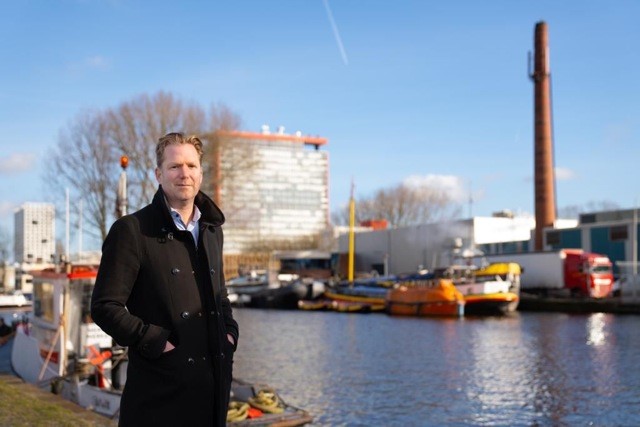Student accommodation and the growth of TU Delft are returning themes in the election manifestos of Delft’s political parties. A series of interviews with party candidates.
Dimitri van Rijn: “The Municipality cannot solve the housing problem alone and needs the help of TU Delft.” (Photo: Alyssa van Heyst)
VVD party candidate and former TU Delft student Dimitri van Rijn (in Dutch) was serving in the military when Central Government took a decision that he found unfathomable – the Dutch navy’s reconaissance aircraft were to be sold off. “We went to Uruzgan around that time so information was needed from the air. I could not understand that decision politically and that is when I decided to enter politics myself.” He has now been in the Delft Municipal Council for about six years.
You have ideas for all sorts of types of housing. What would you do about the shortage of student rooms?
“The number of students at TU Delft grew to 28,000 over the last couple of years. I would like it if all those students could live in Delft, but that is an idyll. So we need to find options in the neighbouring municipalities. We are already doing this in Rijswijk and Schiedam. We also want student housing to be built on campus and we want to make sure that the balance of students in residential neighbourhoods in Delft is right. Dividing houses into rooms has rightly been restricted, given that space is also needed for first time job seekers and young families.”
The land belongs to TU Delft, so they would need to cooperate. How will you convince TU Delft to build more than the current houses and possibly even temporary housing?
“We are already discussing this with TU Delft, who also sees the necessity for it. The priority is to find shared interests. The Municipality cannot solve the housing problem alone and needs the help of TU Delft. Equally, we can help TU Delft by creating more jobs for example, so that graduates can stay in Delft.
Many of the election programmes centre around the growth of TU Delft. How do you envision the future of TU Delft?
“TU Delft is an integral part of Delft. But we need to look at the inflow of students more critically, such as from outside the EU. This needs to be addressed at national level, such as through amending the policy. If the number of students does not slow down, we will run into trouble in Delft. Our former Alderman, Hatte van der Woude, who now has a seat in the House of Representatives, has raised this issue in The Hague.”
Tell us one thing that you managed to do for students or young people last year.
“We started the Smart Makers (in Dutch) in 2020. This is a concept for technical education that connects VMBO, MBO, HBO (various forms of secondary and higher education, Eds.) and universities. There will ultimately be a physical space where secondary school pupils, students, teachers and the staff of companies come together. They could use modern machines to work on real orders such as making tiny houses for a company.”
If you had a big pot of money, what would you spend it on?
“I would reduce the living costs as Delft is an expensive city to live in. By living costs I do not only mean levies such as waste charges and sewerage charges, but also parking rates. Some of the political parties would provide more debt assistance and put together a poverty policy, but I think it would be better to prevent people being driven into debt in the first place. You can do this by ensuring that they do not need to spend all their money in the first place.”
-
For this interview series, the editors of Delta approached all participating Delft political parties by email, sms, phone, Instagram, LinkedIn and Facebook. Despite repeated contact attempts, we did not succeed in scheduling interviews with Bij1Delft, Onafhankelijk Delft and Volt. Read the election programmes of all participating political parties in Delft via this link (in Dutch).
Do you have a question or comment about this article?
a.m.debruijn@tudelft.nl


Comments are closed.